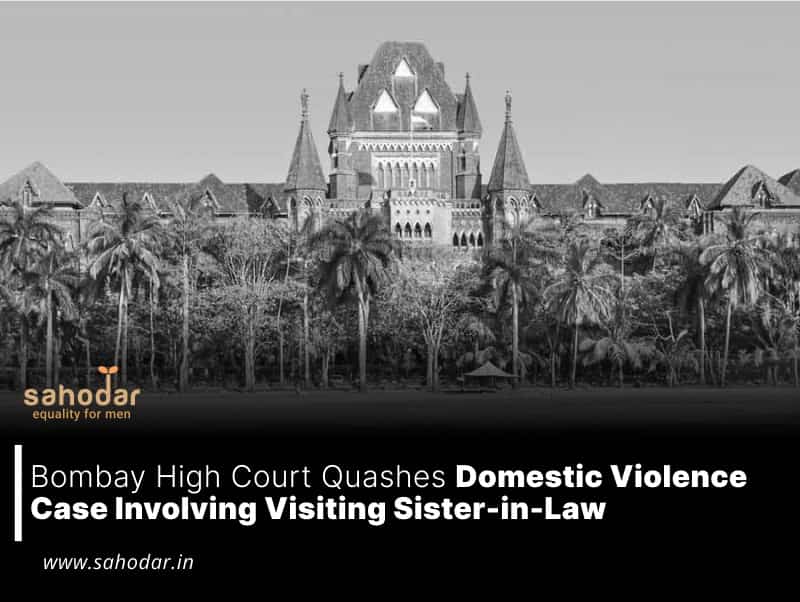The Bombay High Court, in its ruling, invalidated a domestic violence case brought against the married sister-in-law of the complainant, reasoning that the sister-in-law’s recurrent visits to the complainant’s residence, lacking a demonstrable sense of permanence, do not meet the criteria for establishing residency within a shared household.
Justice Sharmila U Deshmukh, presiding over the matter, granted a writ petition filed by the sister-in-law, contesting the decision of the Sessions Court which had overturned the Metropolitan Magistrate’s earlier dismissal of the domestic violence complaint against her.
“there was no subsisting domestic relationship between the Petitioner and the Respondent No 1 and the Petitioner could not have been arrayed as Respondent in the D.V. application. The mere visits of the Petitioner to the shared household being devoid of any permanency is not sufficient and adequate to constitute residence in shared household. Even otherwise considering the pleadings in the applications read with the reliefs, there is no case of domestic violence made out qua the Petitioner”, the court held.
The complainant initiated proceedings pursuant to Section 12 of the Protection of Women from Domestic Violence Act, 2005, seeking relief under various provisions of the Act against her husband, mother-in-law, unmarried brother-in-law, and the petitioner, identified as the married sister-in-law.
However, the Metropolitan Magistrate Court at Girgaon, Mumbai, dismissed the application against the petitioner, determining the absence of a domestic relationship between the parties due to their non-cohabitation within a shared household. Consequently, the court issued notice solely to the other accused parties.
Upon appeal, the Sessions Court overturned the lower court’s decision, deeming the determination of a domestic relationship between the petitioner and the complainant as necessitating a trial and assessment of presented evidence.
In response, the petitioner petitioned the High Court, challenging the Sessions Court’s ruling.
The petitioner asserted that her residence in her separate matrimonial domicile, distinct from the shared household of the complainant, precluded any establishment of a domestic relationship, as defined under Section 2(f) of the DV Act.
Conversely, the complainant contended that the petitioner’s recurrent visits to the shared household constituted a basis for inferring a domestic relationship, despite her separate abode.
The High Court underscored the statutory requirement within the DV Act for cohabitation within a shared household to substantiate a domestic relationship. It elucidated that such a relationship entails individuals who either presently cohabit or have previously cohabited within a shared domicile.
Moreover, the court emphasized the chronology of events, noting that the petitioner’s marital bond predates the union between the complainant and the petitioner’s brother. Additionally, the distinct address provided by the petitioner in the domestic violence application, divergent from the shared household’s address, underscored her separate residency in her matrimonial abode.
“the Petitioner is the married sister-in-law residing in her own matrimonial house and it cannot be said that the right of the aggrieved person to reside in the shared household would constitute a subsisting domestic relationship with the Petitioner. It would have been a different matter if the Petitioner was unmarried and was residing in the shared household”, observed the court.
In her application, the complainant contended that her married sister-in-law habitually occupied the shared household throughout the day, particularly emphasizing the recurring visits spanning from 2:00 pm to 8:00 pm. Nevertheless, the court adjudged that the aforementioned visits, notwithstanding their regularity, failed to evince a requisite degree of permanence to establish a domestic relationship, notably in light of the petitioner’s distinct abode.
Upon due consideration, the court determined the absence of a domestic relationship within the purview delineated by the pertinent legislation due to the petitioner’s separate residency. Furthermore, the court discerned the allegations levelled against the petitioner within the complaint to be generalized and unsupported, lacking in concrete instances of imputable domestic violence.
In its explication of the precedential value of cited case law, the court elucidated that antecedent judgments did not furnish a normative template directly applicable to the instant case. It iterated the imperative of adjudicating each matter on its individual merits, underscoring the imperative of contextual specificity.
Consequently, the High Court nullified the pronouncement of the Sessions Court and reinstated the judgment of the Metropolitan Magistrate, thereby dismissing the petitioner’s application under the purview of the Domestic Violence Act.

